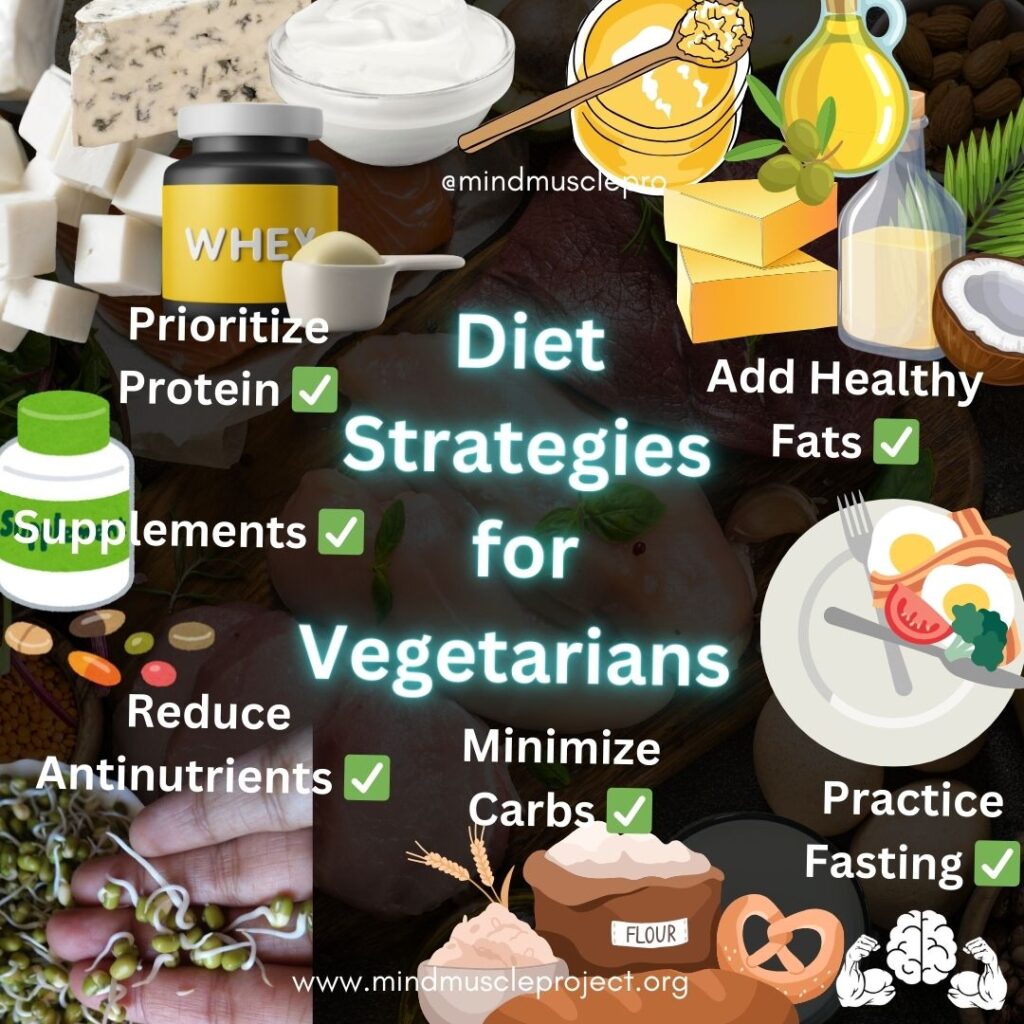Adopting a vegetarian diet can offer numerous health benefits, from reducing the risk of chronic diseases to supporting environmental sustainability. However, meeting your nutritional needs as a vegetarian requires intentional planning and a clear understanding of potential challenges. Without careful attention, you might face nutrient deficiencies and health issues. But with the right strategies, you can thrive on a vegetarian diet.
1. Prioritize Protein #
Protein is the building block of muscles, hormones, and enzymes. As a vegetarian, ensuring adequate intake of high-quality protein is crucial. Here’s how:
- First-Class Protein Sources: Focus on complete protein sources like:
- Paneer (Cottage Cheese)
- Cheese
- Greek Yogurt/Hung Curd
- Whey Protein (Supplement)
- Secondary Protein Sources: Legumes, nuts, and seeds are incomplete proteins and should supplement, not replace, first-class proteins.
Pro Tip: Aim to meet 80-85% of your daily protein requirements from first-class protein sources, with the remainder from secondary sources. Whey protein is an excellent, versatile option for vegetarians of all ages.
2. Consume Quality Fats #
Vegetarian diets can sometimes lack healthy fats, which are essential for hormone production, brain function, and energy. Incorporate these high-quality fat sources into your meals:
- Cooking Oils: Use nutrient-dense options such as:
- Ghee
- Coconut Oil
- Butter
- Extra Virgin Olive Oil
- Avocado Oil
These fats not only enhance the taste of your meals but also provide essential fatty acids your body needs.
3. Beware of Excess Carbohydrate Intake #
Plant-based diets often include carbohydrate-rich foods like grains, legumes, fruits, and root vegetables. While these are nutritious, consuming too many carbs can lead to metabolic imbalances.
- Low to Moderate Carb Approach: Balance your carb intake, keeping it within a sustainable range. This is especially important if you lead an active lifestyle.
- Tip: Avoid overloading on grains and starchy vegetables; balance them with proteins and fats.
4. Incorporate Fasting and Workouts #
For optimal metabolic health, combine mindful eating with intermittent fasting and exercise. These strategies are particularly helpful if reducing carb intake feels unsustainable.
- Fasting: Practice intermittent fasting or occasional extended fasts to enhance insulin sensitivity and metabolic flexibility.
- Strength Training: Regular resistance training helps maintain muscle mass and supports metabolic health.
5. Prepare Grains, Legumes, and Nuts Properly #
Plant foods like grains, legumes, and nuts contain antinutrients such as phytates, oxalates, and lectins. These compounds hinder the absorption of important nutrients like iron, magnesium, calcium, and zinc, and can contribute to gut issues.
- Neutralize Antinutrients:
- Soak nuts before consumption.
- Sprout legumes to improve nutrient availability.
- Ferment grains to enhance digestion and reduce antinutrients.
Pro Tip: Use sprouted flours for baking and cooking to maximize nutrient absorption.
6. Supplement Wisely #
Certain nutrients are difficult to obtain from a vegetarian diet. Supplementing can fill these gaps and ensure optimal health:
- Vitamin B12: Critical for energy production and neurological health, as it’s almost entirely absent in vegetarian diets.
- Omega-3 Fatty Acids: Consider algae-based supplements to support brain and heart health.
- Vitamin K2: Essential for calcium metabolism.
- Other Supplements: Magnesium, zinc, and iron may also require supplementation based on your individual needs.
7. Diversify Your Diet #
To ensure you’re getting a broad spectrum of nutrients, include a variety of plant-based foods in your meals:
- Bee products (Bee Pollen, Bee Propolis)
- Mushrooms
- Avocado
- Blueberries
- Gooseberries (Amla)
These nutrient-dense foods provide antioxidants, vitamins, and minerals to enhance your health.
8. Minimize Exposure to Pesticides and Herbicides #
Vegetarians often consume a higher volume of vegetables and grains, increasing potential exposure to pesticides. Here’s how to minimize this risk:
- Opt for Organic: Choose organic produce whenever possible.
- Simple Detox Trick: Soak vegetables and fruits in water with baking soda for 10-15 minutes to remove pesticide residues.
Key Takeaway #
Being a vegetarian is a personal choice, but it comes with unique nutritional challenges. With careful planning, a diverse diet, and the right supplements, you can overcome these challenges and thrive. Functional nutrition emphasizes mindful eating, personalized approaches, and proactive strategies to optimize your health, whether you’re vegetarian or not.
Remember, a well-balanced vegetarian diet is not just about avoiding deficiencies—it’s about enhancing your overall vitality and well-being.





